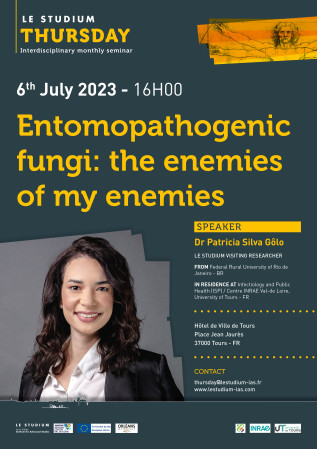Entomopathogenic fungi: the enemies of my enemies
Hôtel de Ville de Tours
Place Jean Jaurès
Salle Anatole France
37000 Tours
France
Presentation
Forecasts indicate that the world population will grow by around 83 million people per year, and if this trend continues, by 2050, there will be 9 billion people on the planet. This considerable growth leads to the need for an increase in agricultural and livestock production to feed the population. The great interest in the study of arthropod pests arises from the high negative impact of these organisms on human society, reducing the productivity of agricultural crops and livestock, impairing food stocks, and as vectors of diseases affecting humans and other animals. Ticks are obligate blood-sucking parasites that cause direct deleterious effects as parasites and vectors of pathogens. Tick-borne pathogens, which cause animal and human diseases such as anaplasmosis, babesiosis, ehrlichiosis, spotted fever, and Lyme disease, have enormous negative impacts worldwide on economic development and on human and animal health. Unfortunately, many tick-borne diseases do not have satisfactory treatments and cannot be cured entirely. To reduce tick-borne diseases, it is necessary to reduce the abundance of ticks. The use of synthetic acaricides is the most used method for tick control. Still, it has led to the emergence of resistant populations and raised concerns about human and environmental health.
Using entomopathogenic fungi arises as a promising alternative when seeking a safer and more sustainable method for tick control. Fungal spores infect ticks on contact and can be used in integrated pest management. Several studies report that spraying fungal suspension on the ticks’ host and in the host’s environment can successfully control this ectoparasite. However, there is virtually no literature on the influence of these fungal treatments on the transmission potential of tick-borne pathogens. Can entomopathogenic fungi, such as Metarhizium anisopliae or Beauveria bassiana, impact the transmission of tick-borne pathogens? How these fungi can affect the microbiota in the gut of the tick. This and other questions will be approached in this talk.
Speaker
LE STUDIUM Visiting Researcher
FROM: Federal Rural University of Rio de Janeiro - BR
IN RESIDENCE AT: Infectiology and Public Health (ISP) / Centre INRAE Val-de Loire, University of Tours - FR







